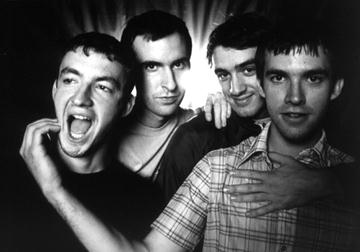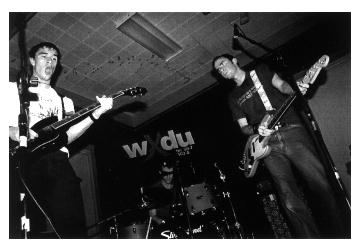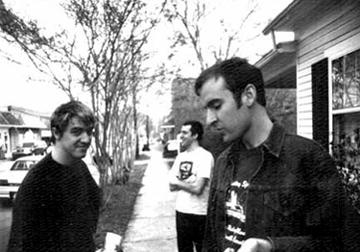

The
White Octave is another fine act on Deep Elm Records. Their debut album came out
a couple off weeks ago, but it was already recorded way back in October of 1999.
As I like this record I decided to ask Stephen (vocals, guitar) and Robert (drums)
some questions…
Any
introduction from you guys, how are you doing?
Stephen:
Hello. Stephen Pedersen is answering your questions. At this moment, I am
fending off the coldness of my home. Our heat is broken and it was near freezing
last night. Brrrrrrrr!
Robert:
I am Robert Biggers; I play drums for the White Octave; I am fine; thanks for
your interest.
Could
you give me the history of the White Octave as not so many people seem to know
your band (hopefully that will change soon)?
Stephen:
The White Octave was formed in the spring of 1999. I moved from Omaha, Nebraska
to North Carolina in order to study law. I had been in bands in Omaha and wanted
to continue to play music. So I made a demo tape and passed it onto Lincoln (bassist)
Hancock. I met Linc through a mutual friend named Eric Roerig. Linc thought the
songs could use some work so he decided to help me. He had been playing music
with Robert Biggers (drummer) who also thought he could help my songs. Our first
show was sometime in March of 1999.
Robert:
The White Octave started out without me at the beginning of January 1999. I
joined soon after. Stephen wrote songs on guitar, and Linc and I helped
arrange them. Things went very quickly for the most part. Somehow we were
able to record with Bob Weston (my favourite) in October of that year. Because
Stephen is in school, it makes it difficult to tour a lot or at all sometimes.
In 2000, we added guitarist Finn Cohen to the mix. Then we toured some in the
summer and just recently (mostly in the northeast). We plan to record again in
January 2001.
Let's
talk a little bit about the album "Style No.6312". I think the cover
art and the layout is brilliant, who had the idea to use these cool pictures?
 Stephen:
I'm not sure who thought of it first. I know Robert and Lincoln worked quite
hard to put the artwork together. In the end, this was the idea that we liked
the most. We thought it was a different approach. We like to take a different
approach.
Stephen:
I'm not sure who thought of it first. I know Robert and Lincoln worked quite
hard to put the artwork together. In the end, this was the idea that we liked
the most. We thought it was a different approach. We like to take a different
approach.
Where
did you get these pictures from, did they appear in kind of a catalogue or
something?
Stephen:
Exactly. they appeared in a sweater catalogue. The name of the album is one of
the styles of sweaters that you could make.
Is
there a connection between the album title and the cover artwork/layout and
which one is that?
Stephen:
As I mentioned above, the title is taken from a style of sweater. Each sweater
in the catalogue was a style number. I think the selection of 6312 was arbitrary.
Robert:
The title of the album is the number of the sweater that the cover girl is
wearing. Her sweater is style no. 6312. There are other sweaters and they are
listed on the disc itself I think.
The
name of your band is pretty unusual, what does it mean and who came up with it?
Stephen:
The name would be my fault. We had been searching for a name for many moons. I
was in my car with a roommate of mine named Jordan Cohen (aka "Cherry
Red"). We were driving to no particular place while listening to the hard
rock station in our city of Durham, North Carolina. After listening to a couple
songs from Rush and a couple songs from Boston, I turned to Jordan and said
"Both these frontmen sing in the "White-guy" Octave. By white-guy
I mean, high pitched, mid-range, almost screeching vocal style. I removed the
word "guy" and had the white octave. That is a silly story (No, I
think it’s cool – Stefan).
Robert:
Stephen came up with it. It's Russian or something (Hey Robert, you should
really ask Stephen about this again… - Stefan)
The
songs for the album were already recorded way back in October 1999. Why did it
take so long to release them?
Stephen:
Good question. The album took so long to release because we moved from one label
to another. The transition caused delay. We are recording our second album in
January and it should be out by late spring early summer.
Robert:
Because another label was going to release the album in May of 99, and then Deep
Elm picked it up (bought it from them). The other label is called Route 14
Records (www.route14.com) - it has a few good local bands on it. So it took
longer because we had to wait for TWO labels to deal with it. It was our fault
for changing our minds at the last minute. It's ok though - Deep Elm is good for
the Octave.
Isn't
it strange to see the release of the album a long time after the songs were
recorded? What are your feelings about the release and are you still satisfied
with the way the songs turned out?
 Stephen:
Sonically, I think the album is amazing. The songs are quite old and reflect a
period of time I can hardly relate to anymore. I wrote most of the songs over a
week in the fall of 1998. I had just moved to North Carolina. I left all my
friends in Omaha, my girlfriend of 3 years broke up with me in the worst kind of
way and I knew virtually no one in North Carolina. The band and I both have
distanced ourselves from the first record. I still enjoy playing most of the
songs though. I like to rock and I think many of the songs still rock.
Stephen:
Sonically, I think the album is amazing. The songs are quite old and reflect a
period of time I can hardly relate to anymore. I wrote most of the songs over a
week in the fall of 1998. I had just moved to North Carolina. I left all my
friends in Omaha, my girlfriend of 3 years broke up with me in the worst kind of
way and I knew virtually no one in North Carolina. The band and I both have
distanced ourselves from the first record. I still enjoy playing most of the
songs though. I like to rock and I think many of the songs still rock.
Robert:
I listen to the album with some frequency, and I’m still satisfied with it.
The songs are old, no doubt, but most of them are still fun to play. But really,
the album came out better than I expected it would - and I expected a lot.
I
think as there is a rather long time between the recordings and the release of
that songs you must have written some new songs? Is this the case and what can
you tell me about them?
Stephen:
As I mentioned earlier, we are recording in January of 2001. We have written 11
new songs. They are all better than the songs on Style #6312. They are more
rocking. Less heartache, more anger.
Robert:
We have written new songs. For the most part, they ROCK more than the older
stuff. But there's always going to be a mix of dynamics in our music I think.
Why
didn't you include lyrics to the album? Do you have a website where one can find
them?
Stephen:
I grudgingly provided the lyrics to Deep Elm. My guess is you can find them on www.deepelm.com.
My words are weak. We didn't include them in the artwork because we wanted
people to enjoy the record.
Robert:
I can't really think of a reason to put the lyrics in the album. That's just me
though. They're on the Deep Elm website, yes.
With
which topics do the lyrics deal and who writes them?
Stephen: Topics include: Faith, relationships (lots of this shit), technology and its intersection with cultural and social norms, school, working. Nothing ground breaking.
The
line-up on that record consisted of three people, but you added a second
guitarist, right? What can you tell me about this expansion of the line-up? Is
he involved in the future songwriting?
Stephen:
We were lucky enough to grab Finn Cohen from the wreckage of his former band,
Fura. Finn, brings even more guitar strength to the band. Everyone is involved
in the songwriting, including Finn. He has contributed to all the new songs for
our forthcoming album.
Robert:
Yes. We are louder now. We are thicker now. The sound is more complex sometimes.
Finn Cohen is a good guitar player. He makes us sound better. He is part of the
songwriting.
How
would you describe your sound and which bands were influential to you when you
started the band and are these the same bands still?
 Stephen:
I can only speak for myself regarding influences. I think if you asked anyone
else you'd get a different answer. So, influences: Cursive, Quicksand, Bettie
Serveert, Tool, The Smiths, The Cure, Boston, Shellac. These bands still effect
my songwriting. I listen to a ton of jazz and classical as well due to all my
reading.
Stephen:
I can only speak for myself regarding influences. I think if you asked anyone
else you'd get a different answer. So, influences: Cursive, Quicksand, Bettie
Serveert, Tool, The Smiths, The Cure, Boston, Shellac. These bands still effect
my songwriting. I listen to a ton of jazz and classical as well due to all my
reading.
A lot of people seem to hate it when their sound is described as emo (it's funny that sometimes their label chooses this description in the info sheet). Why is that the case in your opinion? I think there could be worse descriptions for a band...
Stephen: Any discussion on the idea of emo would take pages to completely hash out a clear thought. Here's a synopsis of my thoughts. Emo, much like the word "grunge" in the early nineties, has expanded into an amorphous and bloated category for thousands of bands across the world that either emulate the style of a couple founding bands (i.e. Fugazi, Sunny Day Real Estate, Quicksand) or plays a style of sugar coated indie-pop. Even with this description I am tightening the definition. Bands would rather not be considered emo because it means one of two things 1) your band sounds like a thousand other bands or 2) your band sucks. For most bands it means both.
Robert:
I don't think we're emo. But (1) I can't define emo, and (2) everyone who is emo
says they aren't. So I'd just rather say that we're a rock band. That wouldn't
be lying. We aren't jazz or country.
Stephen,
you played guitar for Cursive in the past, right? Are they still around or did
you found the White Octave after the split of Cursive?
Stephen:
Yes, I played guitar in Cursive. Cursive is still around. Ted Stevens (from
Lullaby For The Working Class) has taken over guitar duties for me. They have a
new album out on Saddle Creek Records called ‘Domestica’. It is amazing.
Did
you leave Cursive or were you kicked out of the band? What were the reasons?
Stephen: I left Cursive in order to pursue my interest in the law (Hey, I like this guy, hehe – Stefan). Cursive was breaking up anyway. Tim (singer/songwriter) was going to move to Portland, Oregon. Of course, he eventually came back and started the band again.
Does
he still see the Cursive guys nowadays and how do they get along?
Stephen:
Cursive are my brothers. I love them. When we see each other, we usually grab
each others nipples and twist. Then we drink beer and take photographs of us in
compromising positions.
In
reviews Cursive were compared to bands such as Sunny Day Real Estate, Mineral or
At The Drive-In. Which comparisons were made to describe the White Octave's
sound? Do you think these comparisons were ok or just stupid?
Stephen: Cursive is so much tougher than SDRE and Mineral. I would also argue they are better songwriters than all three. I think any description that would assist a music listener in being interested in our band, is fine. So long as the band used to describe us is not misleading the listener. I compare our band to no other band. We have our own sound.
Did
you tour a lot with the White Octave? How long did these tours last and where's
the best place to play in your opinion?
Stephen:
The White Octave has toured and continues to tour in order to familiarize
listeners with our band. My favourite place to play would be either Montreal,
Quebec in Canada or Columbus, Ohio.
What
are you guys doing besides the band, do you have jobs or is the band kind of a
full time thing?
Stephen:
As I mentioned, I am in law school. Robert works for the University of North
Carolina. Finn works for the local rock club and Lincoln works for Duke
University.
Robert:
Unfortunately, we all have to work full time jobs, except Stephen - he's in law
school. I have another band in which I play guitar - it's called Cold Sides.
It's rather new. I like to play a lot with other people.
I
think we're at the end of this interview, hopefully you liked it and do you have
anything to add?
Stephen:
Thanks, we want to come to Germany. I am wearing Lederhosen (I’d like to
see that – Stefan).
Robert:
Thanks so much for interviewing me and us and thanks again for your interest in
the band.
(Stefan
Münch)